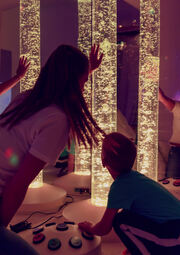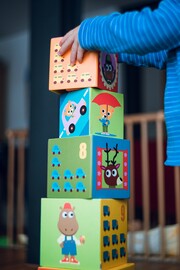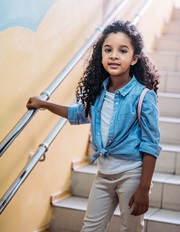4 Things to Know About Screen Time for Children with SPD
Everyone with access to a screen in the modern era, whether a phone, tablet or gaming computer, needs help pulling away from their compelling content. Obsessive tendencies could make anyone’s reaction time or sensory awareness compromised.
However, sometimes in children, sensory processing disorder (SPD) explains more than an overreliance on technology for distractions. Understand the relationship between screen time and SPD, knowing how the signals illuminate a child’s development.
What is Sensory Processing Disorder (SPD)?
SPD explains when the brain registers senses differently than others. Sometimes it is challenging to diagnose as it is a side effect of another condition or a child may need behavioral analysis.
Processing the five senses — sight, hearing, smell, taste and touch — could be difficult, delayed or cause sensitivities. However, SPD also affects other sensory abilities, including:
- Proprioception: Understanding the relationship between movement and location.
- Interoception: Perceiving internal occurrences in the body.
- Vestibular: Sensing balance and maintaining stable mobility.
When a child’s senses are affected by SPD, or its variants, such as sensory-based motor disorder (SBMD), it can alter their development. When encountering modern sensory influences like screens, it’s evident how the relationship between the two phenomena could impact mental, physical and emotional growth.
1. Screens Shouldn’t Be the Default Distraction
Guardians should find alternative ways to distract or cure children from distress. Not only do the rapid movements of cartoons or social media engagement confuse how their brains process visual stimuli, but it also exposes them to excess blue light, halting melatonin production needed for restful, healing sleep.
Human brains, especially for developing children, still need to adapt to match the influx of information coming through screens — and adult humans still haven’t perfected the art of processing information at the speed screens pressure our minds to.
Studies explain how screens cause developmental issues in young children, specifically those under two. Though many parents find screens an easy solution for a screaming child, this seemingly harmless phone passing could have long-term consequences, especially for children who already experience alternative sensory processing.
The system processing sensory input and mood analysis — the vestibular system — is inactive in front of screens, making them unable to practice controlling and responding to emotional changes.
2. Not All Skills Are Equal
Parents may be impressed by their child’s fine motor skills playing video games on a tablet or the ability to ingest information from YouTube videos. Though these skills may be helpful for a modern learning environment, excess exposure to these mediums inhibits potential learning in other soft skills, such as emotional awareness or relationship building.
Parents must not get distracted by the proficiency their children with SPD have in screen-related skills so much they forget how essential it is to peel them away to practice other talents. Parents can have pride, but they must remember how their sensory perceptions may not be able to adapt equally to skills outside of screens, like collaborative social interactions or anger management.
Handing children with SPD screens could immediately test their sensory capabilities in a discomforting way, causing sensory overload or chemical imbalances preventing further growth. No matter how much fun the child has or how focused they seem, sometimes the adverse effects aren’t immediately apparent.
Their minds are working on overdrive to keep up, and though this seems like a welcome test in maintaining attention, it tires most minds past capacity to where taking the screen away causes temperament issues.
3. Instigating Conversations Cause Self-Awareness
Children with SPD can adapt as long as parents set expectations early. Consider setting screen limits or creating habits to actively discuss how the child feels after extended time with screens. Parents could make a healthy, intentional routine of practicing self-reflection by asking their children with SPD after each screen session:
- How did you feel before using this technology, and how do you feel now?
- Did you learn anything while using the screen, and are there ways you could’ve learned this lesson without the screen?
- What drew you to the screen in the first place? Was it an emotion like boredom or frustration that could’ve been mitigated with another activity?
- What sights and sounds did you notice, and how did they make you feel?
Prompting questions like these will not openly vilify screen time — because sometimes it does have merit, especially for learning. However, it will force children with SPD to analyze their senses and feelings more actively.
4. Physical Side Effects Happen Alongside the Emotional
Screens inhibit emotional and sensory processing in the vestibular system. However, it’s vital to prevent other forms of stunted development. For children who may already struggle with developmental problems, adding physical conditions to the mix will only exacerbate sensory development.
One of the most common side effects of extended screen time is hunched backs and strained necks. The body shouldn’t be in these positions for long, and it causes insufficient self-regulation, among other ailments:
- Poor posture and back health
- Neck issues, like reduced neck extension
- Fewer chances for proprioception, causing stiff joints and less nervous system stimulation
- Sight deficiencies like depth perception problems or nearsightedness
- Reduced sleep quality
Developing Healthy Relationships With Screens
Everyone will feel the effects of prolonged screen exposure. However, children with SPD must pay special attention to how they interact and think after spending time with them. Parents can monitor their children and how they use screens.
However, technology is an inevitability humans need to learn to live alongside for a sustainable future. Instilling healthy habits and meaningful self-reflection will help children with alternative sensory development experiences evolve safely without an over-reliance on technology.
About the Author
 Ava Roman (she/her) is the Managing Editor of Revivalist, a women’s lifestyle magazine that empowers women to live their most authentic life. When Ava is not writing you’ll find her in a yoga class, advocating for her children or whipping up something delicious in the kitchen!
Ava Roman (she/her) is the Managing Editor of Revivalist, a women’s lifestyle magazine that empowers women to live their most authentic life. When Ava is not writing you’ll find her in a yoga class, advocating for her children or whipping up something delicious in the kitchen!










